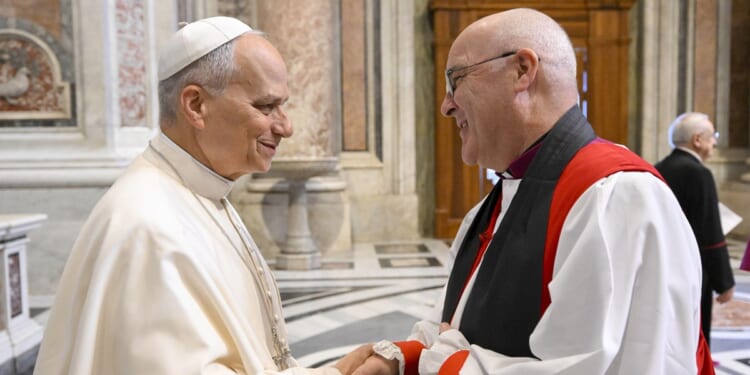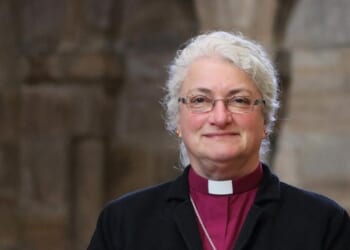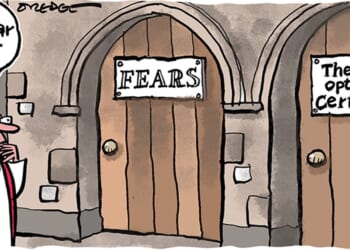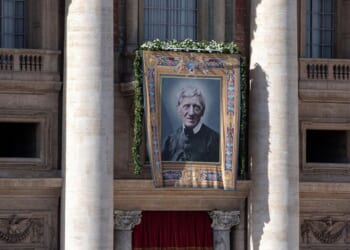“LEAD, kindly Light, amid the encircling gloom. . .”
So begins one of St John Henry Newman’s most famous and popular hymns. It was sung in Italian in St Peter’s Square on All Saints’ Day, when Pope Leo XIV declared Newman a Doctor of the Universal Church. He becomes the 38th such Doctor, and only the second English person, after the Venerable Bede, to receive the distinction.
It was good to lead a delegation from the Church of England to witness this important moment, and to join our prayers with our Roman Catholic brothers and sisters in thanksgiving for Newman’s life and thought, and to honour his continued influence on theological methodology, spiritual insight, and education.
But why? Why should such a moment matter to us in the Church of England? After all, we can study Newman’s works without the particular commendation and authority that come from his being recognised as a Doctor of the Church by the Pope.
But, in Rome last Saturday, something profound happened. The process to declare anyone a Doctor is a complex one, requiring the support of bishops and the faithful around the world. A long document is prepared to outline the many facets of the subject’s theology, teaching, preaching, and other writing. Everything that has been written is scrutinised and weighed to ensure that it does not depart from the teaching of the Roman Catholic Church, and thus can guide the faithful in the deepening of their life in Christ.
And there is the point. Newman’s output was prodigious, and much of it came during his time as a Church of England priest, serving and teaching in Oxford. Some 600 sermons are collected from this period, and much of his theological thought was formed and honed as an Anglican (including the hymn “Lead, kindly Light”).
It was for this reason, with the support and encouragement of other bishops, that the then Archbishop of Canterbury and I wrote to Pope Francis in February 2024 to express our support for the proposal that Newman be recognised as a Doctor of the Church, as an “act of ecumenical fraternity and ecclesial charity”.
Thus, for the first time, the work of someone who was thinking and writing initially as a Church of England priest has been recognised formally as being part of the teaching of the Roman Catholic Church. Perhaps, given Newman’s later path, that should not surprise us; but this simple recognition is a step on our journey towards the unity that is Christ’s will for his Church. It is another sign of mutual recognition, and a small step in understanding what brings us together.
Those involved in this process tell us that the letter that we sent to Pope Francis was an important factor in this decision. I do not know whether this was so, but, when Cardinal Marcello Semeraro, the Prefect of the Dicastery for the Causes of the Saints, addressed Pope Leo last Saturday to set out the reasons that Newman should be declared a Doctor, he noted the support that had been voiced on behalf of the Church of England. That is another rarity, possibly even a first: that the view of the Archbishops of the Church of England was a factor in the decision-making of the Roman Catholic Church.
Newman taught how the sensus fidelium works, how the voices of the bishops, clergy and laity combine to discern doctrine and truth. So, on the ecumenical journey, too, it seems that it is possible for the bishops of the Church of England, and Archbishops of sees that trace their route to the missions sent from Rome by Pope Gregory the Great, to contribute to that discernment, even though long separated from the Bishop of Rome.
Indeed, one of the learned contributions to the posito in support of the declaration was written by a US-based scholar who is also a priest of the Episcopal Church. These, too, are further steps on the journey towards unity.
Addressing the pilgrims who filled St Peter’s Square, Pope Leo noted that the presence of a delegation from the Church of England, “following the historic prayer meeting with His Majesty King Charles III, celebrated a few days ago in the Sistine Chapel . . . expresses our shared joy in the proclamation of St John Henry Newman as a Doctor of the Church”.
Joy indeed. And deep joy in not only the recognition of the teaching and thinking of this great man of faith, but also in the manner of that recognition — for, in all these things, there is a glimpse of the healing of division, amid the gloominess of the world, and of the flickering light of unity that we find in Christ. Lead thou us on!

















